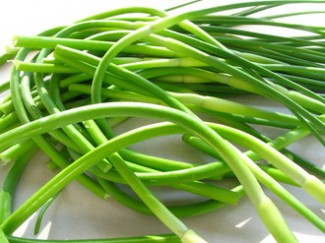Garlic Scape and Almond Pesto

Scapes are the wild and curly shoots that spring from the tops of garlic plants. They're brilliantly green, can be thick or thin, curved or corkscrewed, and, depending on how they're cut, just long or very long. They've got a mild garlic fragrance and a mellow garlic flavor. Smell the cut end or snap one and the scent will be a cross between garlic and summer grass. It's got a freshness that garlic loses as it develops. The scapes, which look as beautiful in the garden as they do at the market, are meant to be cut -- cutting them strengthens the garlic bulbs that are growing underground -- so it's a win-win for the garlic and us, the cooks. Although scapes needn't be cooked. In fact, if you do cook them, you should cook them lightly, maybe in a quick stir-fry. I think you get the most from garlic scapes by using them raw. They're terrific chopped or very thinly sliced added to a tuna or chicken salad, stirred into hot rice or scattered over a salad, the way you might scatter sliced scallions or an herb. And they're wonderful as the base of a chunky pesto, which is how they are used here. I was going to put the pesto over quickly grilled scallops, but it seemed to cry out for pasta, so it got stirred into penne. At least the part that was left after my husband stopped dipping bread into it got mixed with the pasta. But he had the right idea -- because the pesto is chunky and so bright tasting, a spoonful on a hunk of bread makes a really good nibble with white wine. I was going to say that it's too bad that the scape moment doesn't coincide with tomato season, since they're be stupendous together, but then I realized I can make them coincide: Garlic scape pesto is freezable!
10 garlic scapes, finely chopped
1/3 to 1/2 cup finely grated Parmesan (to taste and texture)
1/3 cup slivered almonds (you could toast them lightly, if you'd like)
About 1/2 cup olive oil
Sea salt
- Put the scapes, 1/3 cup of the cheese, almonds and half the olive oil in the bowl of a food processor (or use a blender or a mortar and pestle).
- Whir to chop and blend all the ingredients and then add the remainder of the oil and, if you want, more cheese. If you like the texture, stop; if you'd like it a little thinner, add some more oil.
- Season with salt.
-
If you're not going to use the pesto immediately, press a piece of plastic against the surface to keep it from oxidizing. The pesto can be stored in the refrigerator for a couple of days or packed airtight and frozen for a couple of months, by which time tomatoes should be at their juciest.